The Thomas Crown Affair (1968)
'In the Windmills of your Mind...'
Thomas Crown: What a funny dirty little mind.
Vicki Anderson: It’s a funny, dirty little job, so shoot me in the leg.
Thomas Crown: Always get your man?
Vicki Anderson: Of course.
Thomas Crown: Think you’ll get me?
On the 4th of February, 1962, The Sunday Times launched its first colour supplement. The editor was Mark Boxer, and the ‘magazine’ (then called a ‘section’ for legal reasons) included David Bailey’s split-screen photographs of Jean Shrimpton, a Mary Quant dress, and The Living Daylights, a new James Bond story by Ian Fleming. Despite the furore, actually newspaper magazines were nothing new. By the early 1960s, The New York Times Magazine (first published in 1896) had developed into a rather brainy tome, ‘a forum for ideas’, both literary and political, featuring the likes of black-and-white photographs of Lyndon B. Johnson, Washington Memorial and desk. Browsing through back copies of both magazines, the British Sunday Times equivalent seems decidedly funkier, more visual, exciting— happening— and on-trend.
This happy event coincided with the invention of the credit card: The BankAmericard in 1958, followed in 1966 by Interbank (later Mastercard), fuelling a credit card boom, with the British Barclaycard following in 1967. The rise of the colour supplement and credit card is no coincidence, I think. Both fuelled the other. The magazines survived on advertising revenue, the new credit cards on aspiration. Both are inextricably linked. Credit allowed the aspirational middle class to buy luxury things, previously the preserve of the rich. And with this came a desire for connoisseurship— or at least, perceived connoisseurship, the trappings of Old Money (still valid in those days, if a waning influence) as peddled in the colour supplements: expensive cognacs, Viyella, single malt whiskies, Daimlers, antique chess sets, Sotheby’s cigarettes— if juxtaposed with disturbing grainy photo-journalism: The Vietnam War, shady African coups, the effects of a Napalm attack. Peeling skin.
The Thomas Crown Affair (1968) is the most aspirational of all aspirational films. It’s the zeitgeist of 1968. Like a backlit ad for Martini, The Thomas Crown Affair has it all: split-screen polo, the three ‘gs’ (gliding, gambling and golf), ‘dune’ beach buggies, the shenanigans of the art world, international finance. And The Thomas Crown Affair makes business look sexy. Chequebook glamour. This idea of the ‘executive’, is very late 60s, all the glamour of corporate America: landing at the airport and negotiating customs— “business or pleasure?”— the excitement of the dodgy Swiss bank account “It’s Geneva on the ‘phone, Mr. Crown”, dollybird secretaries connected to a buzz-box speaker machine on your power desk: ‘Buzzzzz… “Mister Schicklgruber to see you Mr. Honey.” “Thanks, Brandi. Keep ‘im waiting for four minutes, then just send ‘im right in.” Jeffrey Archer was into this sort of thing (I’m thinking Not a Penny More, Not a Penny Less)— when, alas, as you and I know only too well, the reality of business is all the fun of accountancy, compliance, cold instant coffee and spreadsheets.
I'm trying to work out what Thomas Crown (Steve McQueen) actually does? Apart from his upmarket criminal tendencies? A currency trader? Arbitrage? Some sort of asset stripper à la Jimmy Goldsmith or Jim Slater? Mr. Crown's office is seriously megalomaniac. There's a ginormous globe (just like the Berchtesgaden), obelisks, panelling, decent antiques, lots of space. And he drives a Mulliner Park Ward Rolls-Royce coupé in very dark green or chocolate brown, with white-wall tyres. He lives in Beacon Hill, Boston, in a desirable early 19th-century red-brick Georgian house with green shutters and employs a white-coated butler— “I won't be needing you tonight, John.” And he wears a three-piece suit by Douglas Hayward.
Vicki Anderson (Faye Dunaway) makes the most glamorous insurance investigator I've ever encountered. They don't make 'em like that anymore. And she plays a mean game of chess (for the record, it's an Indian Export Vizagapatam ivory chess set, circa 1820), whilst sipping brandy from the most vulgar cognac glasses known to history. With an imperial N and crown. In fact, so splendidly vulgar, I would like to find a set for myself.
As a director, I like Norman Jewison enormously. The dystopian Rollerball (1975) is one of my favourite films, especially because of the uber-stylish party sequence, which sort of sums up all that is good about the mid-1970s. Jewison, I think, gets the zeitgeist. And so, in The Thomas Crown Affair, apart from the split-screen technique, we have the music of French composer Michel Legrand— a huge bonus— and The Windmills of Your Mind (sung in mockney by Noel Harrison, son of Rex) used to effect in a rather beautiful scene with a glider and Mr. Crown’s sexy French girlfriend in a brown trouser suit. As a film composer, Michel Legrand’s up there with the very best. I’m thinking The Umbrellas of Cherbourg (1964), starring She-Who-Can-Do-No-Wrong Catherine Deneuve, and Joseph Losey’s The Go-Between (1971), starring Dominic Guard of Picnic at Hanging Rock (1975) fame.
Although we might admire Mr. Crown's dash (he's a cool dude), he's not an especially nice chap. Almost lobotomised. Apart from the odd megalomaniacal laugh. He likes to buy ‘cos he likes to buy. I'm slightly suspicious (with, of course, a few notable exceptions) of the sort of people who employ art advisers. Rich folk and their limited edition Picasso lithographs or William Russell Flint watercolours to hang above the double bed. Their art collections lack personality, spirit and continuity. Mr. Crown is one of these. A man who knows the price of everything and the value of nothing. And isn't he a bit like Bond? A characterless blunt tool of government? Although interestingly, George Lazenby's Bond might have broken the mould. The final scene in On Her Majesty's Secret Service (1969) still brings a lump to my throat.
All this reminds me of Waddington's Go- the International Travel Game of 1961. A fertile training ground for International Men and Women of Mystery. Especially exciting for the pre-pubescent. Travel the world by E-Type Jag, BOAC jet airliner or the RMS Queen Mary! Buy a Chinese antique in Hong Kong! Trade Dollars, Sterling, Yen or Roubles! The triumph of style over substance. But at least Mr. Crown's taste aspires to the finer things in life. To antiques, a Georgian house, fine brandy, cigars, a game of chess, and, by today's standards, a relatively understated Rolls-Royce.
In 2008, Hasbro (the American games manufacturer) updated Cluedo (Clue in the United States). Murder weapons now include a baseball bat, dumbbell and trophy. The Billiard Room is now The Spa, The Cellar an indoor Swimming Pool. There's a private cinema. And Colonel Mustard is now Jack Mustard, 'the famous football player'; Miss Scarlett, Kasandra Scarlet, the ‘hottest star on the movie scene’; and Professor Plum, now Victor Plum, a billionaire video-game designer. Mr. Crown's house today, would be a very different affair, a triumph of the bland: a huge television set on grey walls, a private gym, dubious abstracts, 'statement artwork', an infinity swimming pool, and Mr. Crown's attire too: cashmere 'loungewear', a chin adorned with stubble. All history erased, as if the past didn’t exist. But at least Mr. Crown could afford to buy his trainers from Sotheby's. In a limited edition.
I watched The Thomas Crown Affair (1968) on— oh, horror— VHS (I have a nifty film-buff Video/DVD combo set-up). But it is, of course, also available on DVD and Blu-ray, and to download on various digital download platforms. Please don’t confuse the 1968 Thomas Crown Affair with the 1999 remake (the thing with Pierce Brosnan and Rene Russo) which is actually okayish, if not quite good— but in my opinion, still not a patch on the original.
You’ve just been reading a newsletter for both free and 'paid-for' subscribers. I hope you enjoyed it. Thank you to all those of you who have signed up so far.
There are two options for Luke Honey’s WEEKEND FLICKS. Cinema for Grown Ups: ‘Paid-for’ subscribers get an extra exclusive film recommendation every Friday morning, plus full access to the complete archive— which is currently on film no. 70, and should list over a hundred films by the end of the year. It costs £5 a month (or £50 a year)— a bargain, frankly, when you compare it to a few cups of coffee, a packet of semi-legal gaspers, or a pint of beer in the pub. ‘Free’ subscribers get access to the Sunday newsletter, plus the ‘free subscriber’ films in the archive. Either option is a good bet. And when I get my act together, I’m planning to add a spoken voiceover (mine!) for paid subscribers.
I hope you enjoy The Thomas Crown Affair (1968) as much as I did. I will be back next Friday. In the meantime, have a relaxing and cinematic Sunday….


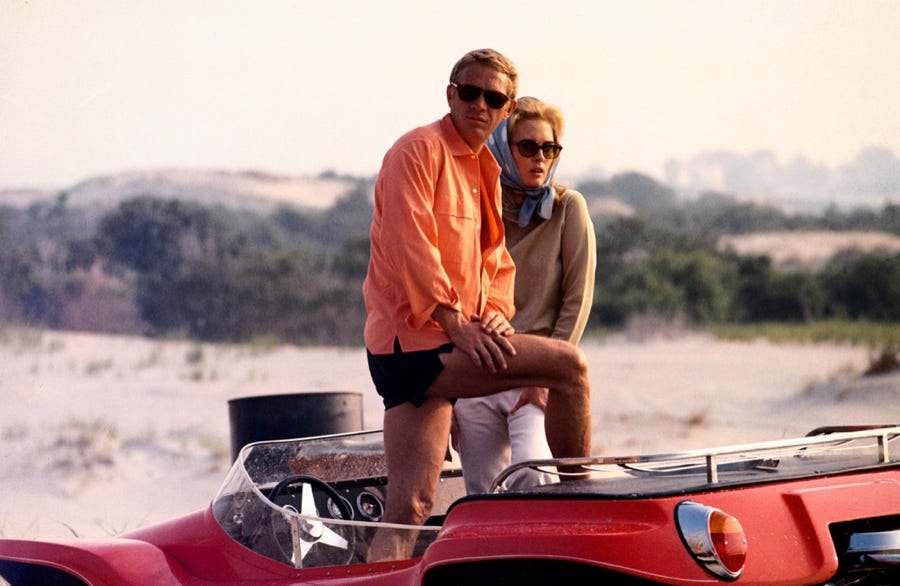
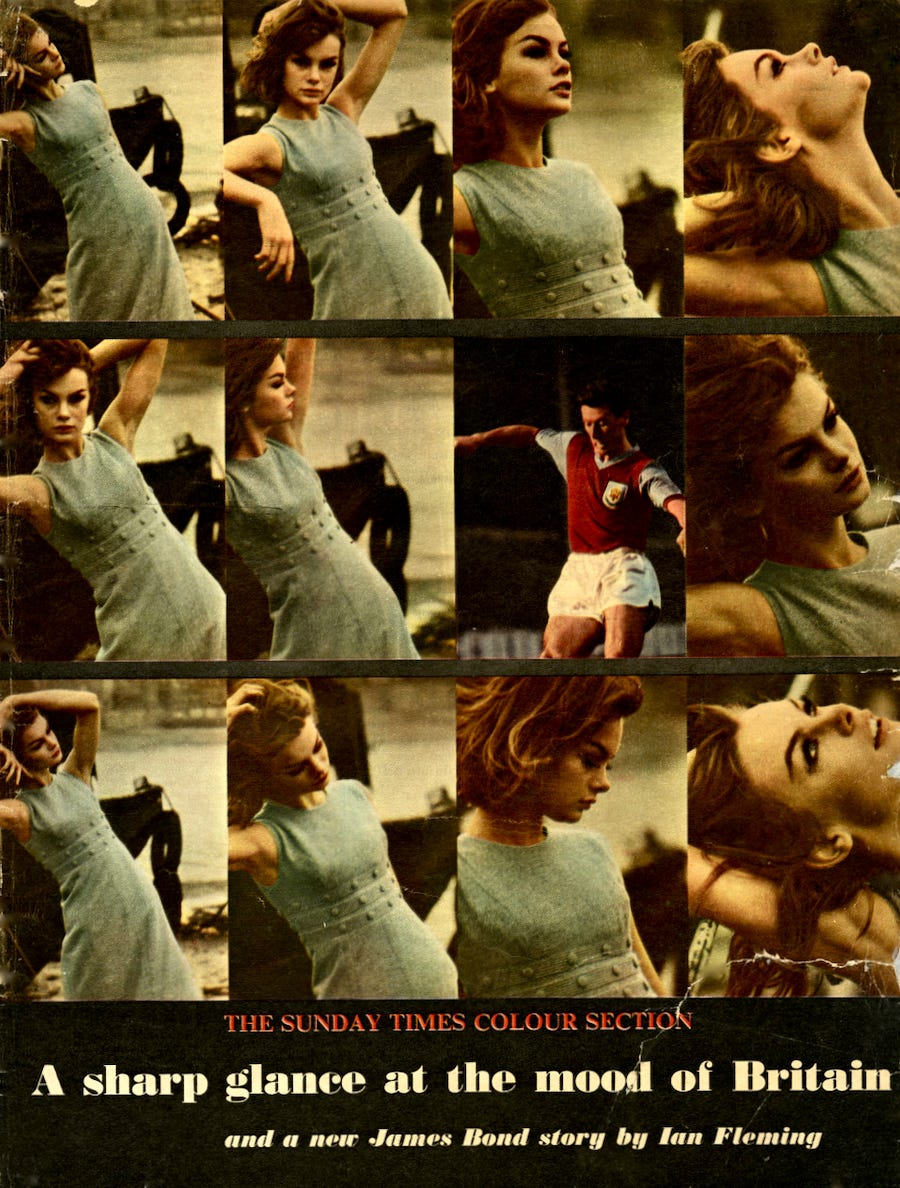
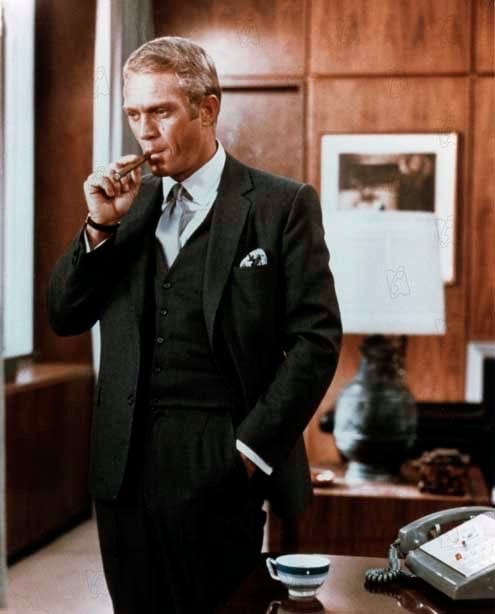
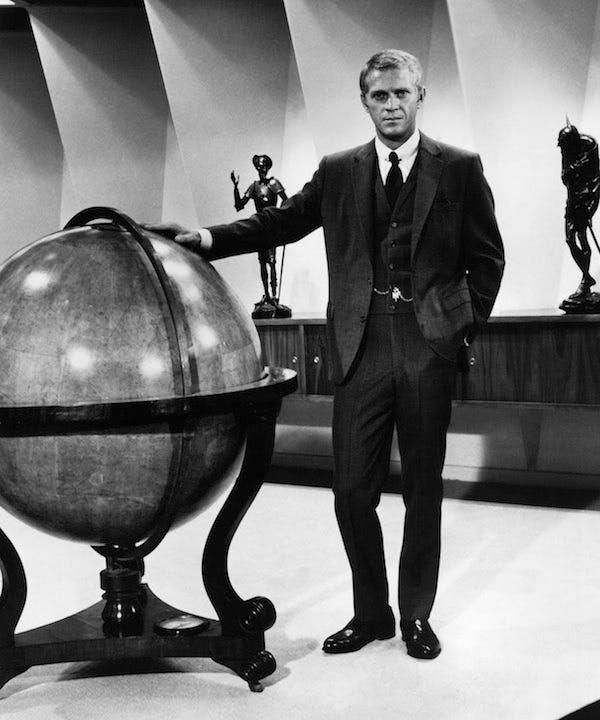
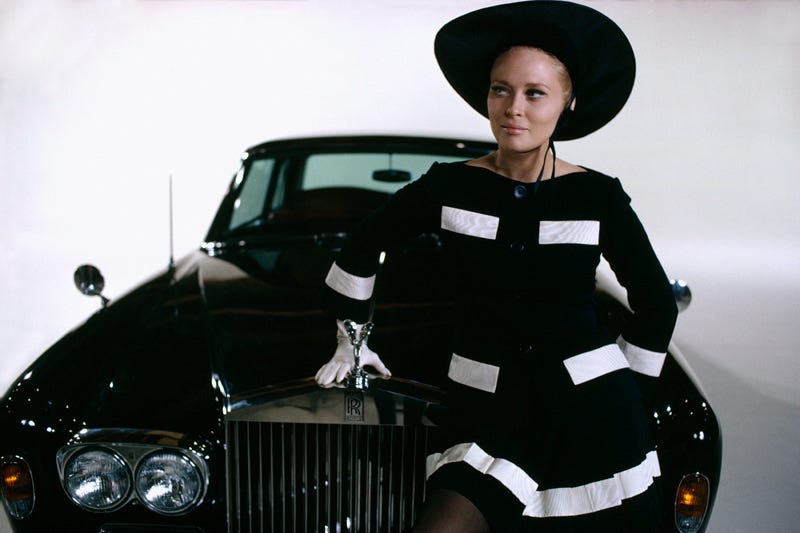
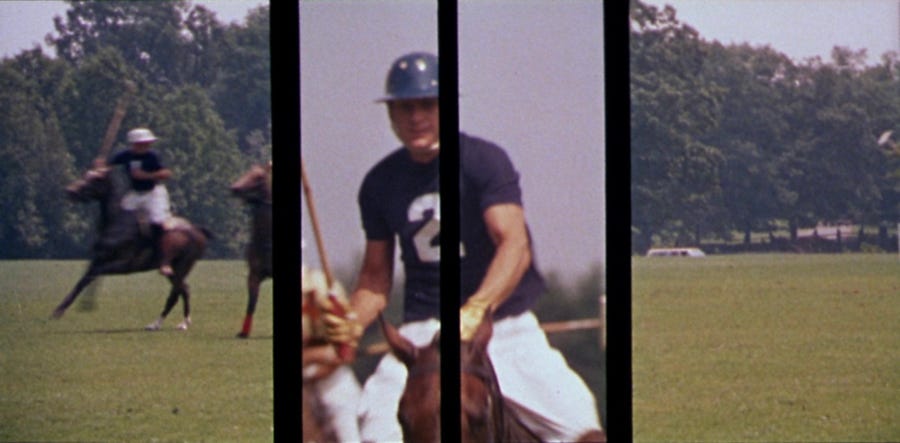
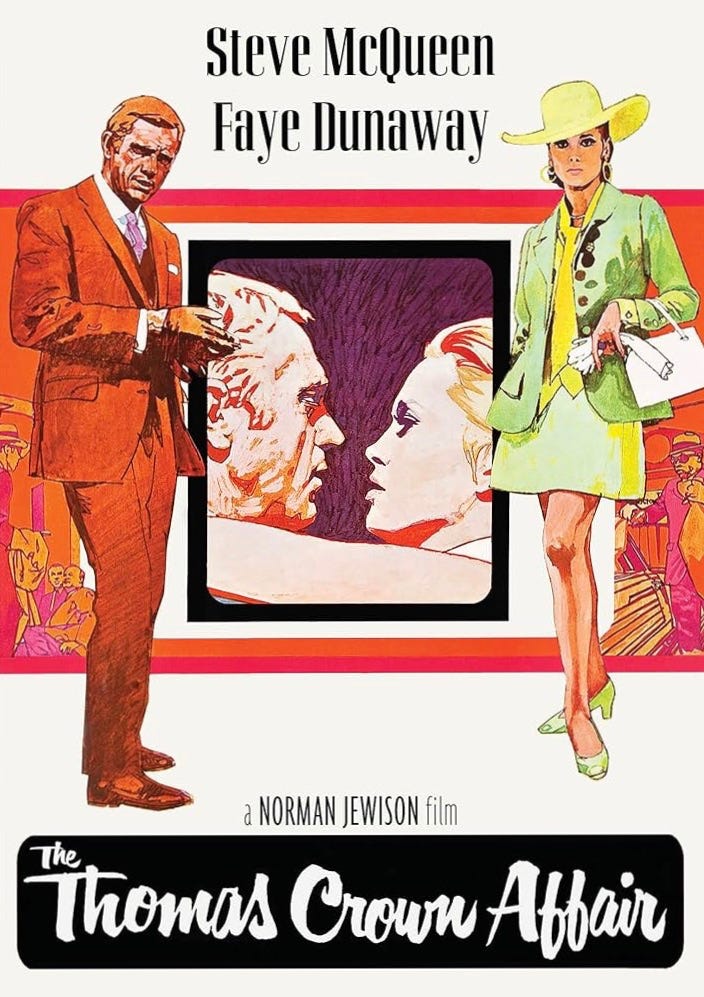
I wonder which secretary/account rep/client was treated to that film and dinner by Dan Draper?
I was distracted by the beautiful Jean Shrimpton for a second! A wonderful in-depth review of this timeless and uber stylish movie Luke, I thoroughly enjoyed reading this. I agree about Norman Jewison, I loved In the Heat of the Night.